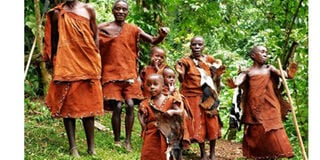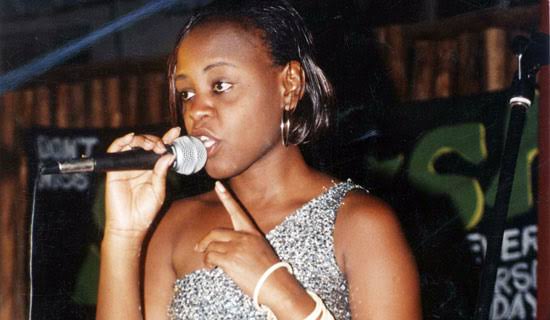Prime
Minority groups ask government for better services

The Batwa commonly known as pygmies are recognised as an indigenous minority group in Uganda. They live in the Echuya Forest Reserve in Kisoro and Kabale districts of south-western Uganda. PHOTO/NET.
What you need to know:
The CCFU report recommends provision of IMGs with adequate, accessible, and culturally appropriate information on the pandemic, through the use of indigenous languages
As Uganda responds to the rapidly evolving Covid-19 pandemic, indigenous minority groups (IMGs) which constitute one per cent of the country’s population, are denied access to essential social services and livelihoods, a new study shows.
Government rolled out a relief programme that involves the distribution of food items, starting with vulnerable people in urban areas and other districts. By the end of July, government had not distributed food to IMGs.
Yet several IMGs already face food insecurity, as a result of the loss of their traditional land, occupations and ways of life, according to a report titled “The Covid-19 Pandemic: What Impact on Indigenous Minority Groups in Uganda?”
The report reveals that the Bagungu, Batwa, Batuku and the Kebu had only received food from well-wishers. With the restrictions on travel and the night curfew, IMGs are unable to engage in activities to earn a living.
“Some Bagungu are unable to earn from salt mining because the economic activity has been prohibited due to associated gathering and works at night.
Desperation can lead to exploitation: Banyabindi women have been forced to provide cheap labour for survival, for Shs2,000 daily, compared to Shs5, 000 or Shs7,000 previously,” the report adds.
Impact of Covid-19
In April 2020, the Cross-Cultural Foundation of Uganda (CCFU) conducted a study to ascertain the impact of Covid-19 on the health, cultural rights, livelihood and education of IMGs.
The study covered the Ik, Mening, Nyangia, Napore, Ngokutio and Tepeth in Karamoja; the Lendu and Kebu in West Nile; and the Bagungu, Batuku, Bamba, Babwisi, Bavanoma, Batwa, Basongora, Banyabindi, Bagabo and Bacingwe in western Uganda.
The idea was to lobby for support from Covid-19 district task forces and other development partners, who are responsible for providing material support to such communities and for monitoring their use.
More than 285 respondents, including community leaders, women, youth and elders were interviewed.
Existing inequalities
According to the IMGs, the pandemic has exacerbated the existing inequalities and human rights abuses that affect them in Uganda.
According to the report, most public communication on Covid related content is in English and/or the language of the dominant ethnic group where IMGs reside.
Certain categories of people within IMGs, especially women and elders, have consequently been excluded from receiving this information.
Ngakarimojong, the dominant language in Karamoja is for instance used to reach out to several IMGs in the region, including the Napore, Nyangiya, Ngokutio, Ik and the Tepeth.
Lack of communication tools
Additionally, public health communication and security regulations have been widely delivered through radios, television, posters and social media platforms, yet few of the IMGs are able to access these messages through such channels, as most of them live in remote areas and do not possess the necessary communication tools.
“The dormant language often becomes the dormant language of communication hence suffocating the minority languages. Indigenous minority groups are despised, which has created fear among ourselves,” the prime minister, Obudingiya Bwa Bamba, Wilson Mubulya says.
He says the National Curriculum Development Centre should support developed orthographies (art of writing words with the proper letters according to standard usage) of indigenous minority groups. Mubulya suggests that IMGs can only preserve their cultures when the medium of instruction is in their languages.
Mubulya and Ocanda were among the members of the National Coalition for the Protection of the Rights of IMGs in Uganda, who spoke during the launch of a report produced by CCFU on August 11, in Kampala.
The report was launched in commemoration of the 2020 International Day of the World’s Indigenous Peoples that falls on August 9, every year.
Limited access to health services
According to the report, IMGs experience limited access to healthcare services and suffer from communicable and non-communicable diseases than other communities, with lack of access to essential services, sanitation, clean water, soap and disinfectants.
“Medical facilities, far away from the remote areas where many IMGs live, are not well equipped and are understaffed. Among the Mening, the nearest health centre is in Lokori Sub-county, about 10 kilometres away. In Karenga, where the Ik live, there is a population of 84,100, yet there are only two government health centres and a privately owned health facility to serve the entire district…,” the report reads in part.
No online lessons
In spite of the thematic curriculum, access to online learning is beyond reach for many IMGs. In the 14 villages of the Basongora in Nyakatonzi Sub-county in Kasese District, only three homes have a television set.
For some communities, a radio is a luxury. Many IMG families cannot afford access to information via radios and the dominant languages used on these media outlets are usually those of the dominant ethnic groups.
“We are having very many early marriages because many girls believe that when you get to a certain age, you have to get married. Many girls have eloped and others are now pregnant. I don’t know how many girls will go back to school when schools reopen,” Ocanda laments.
Food insecurity
Agnes Kabajuni, Africa Regional manager for Minority Rights Group says the impact of Covid-19 to the ethnic minorities cannot be generalised.
She says the marginalised ethnic minorities such as the Batwa have been left extremely vulnerable to food insecurity and more lacking in access to essential services as basic health care.
“There has not been targeted inclusion of ethnic minorities in planning and executing the government response on Covid-19 impact on population. They remain least or not all represented in decision-making processes,” Kabajuni says.
Out of the 65 officially indigenous communities in Uganda, 21 are small ethnic groups, with less than 25,000 people who include Tepeth, Banyara, Batuku, Paluo (Chope), Babukusu, Banyabindi, Lendu, Basongora, Ik, Batwa, Bahehe, Dodoth, Ethur, Mening, Jie, Mvuba, Nyangia, Napore and Venoma, among others.
They collectively represent more than one per cent of the national population, or more than 200,000 citizens. There are nine other minority groups with up to 100,000 people each.
Recognise other minority groups
The Uganda Constitution lists minority groups such as the Bamba, Babwisi, Bagwe, Bagungu, Bakenyi, Kebu, Nubi and the Ngikutio. Some groups are yet recognised in the Third Schedule of the constitution including the Basese, Bagangaizi, and the Benet.
Mubulya says it is about time to recognize other indigenous minority groups that were not initially captured in the Constitution.
Due to their small numbers, history, marginalisation, prejudice and stereotypes on the part of the more numerous Ugandan communities, ethnic minorities hardly feature in any national political or cultural discourses.
The CCFU report recommends provision of IMGs with adequate, accessible, and culturally appropriate information on the pandemic, through the use of indigenous languages.
They demand to be included in the design and implementation of response measures and to have access to healthcare services.
They also want access to education, food, clean water and improved livelihoods. On matters of health, IMGs want policy makers to distribute masks, clean water and disinfectants considering that they live at border points.
Post Covid-19 interventions
They demand that the principles of equality and non-discrimination, as well as affirmative action, therefore guide government and NGOs intervention in the prevention, management and possible cure of the Covid-19 pandemic.
“If we are included on the Covid-19 district taskforces we shall be able to identify our needs and what we want for post Covid-19 interventions and our voices will be heard,” Ocanda says.
In her remarks, during commemoration of the 2020 International Day of the World’s Indigenous Peoples the chair, UN permanent forum on indigenous issues, Anne Nuorgam noted that that Covid-19 continues to disrupt our lives as never before.
Gender-based violence
According to Nuorgam, indigenous elders are the guardians of history, traditions, languages, and cultures and are particularly vulnerable.
They deserve special attention to safeguard and prevent bio-cultural loss. Indigenous communities worldwide are facing food shortages, lost livelihoods, and of course, illness and death.
“Indigenous women are facing severe hardships in providing for their families during this pandemic, and there are reports of food shortages in many communities. An additional factor is that the lockdowns have exposed indigenous women and girls to heightened risks of gender-based violence,” Nuorgam said.
World’s Indigenous Peoples Day
Each year, UNESCO celebrates the International Day of the World’s Indigenous Peoples by sharing information on projects and activities undertaken.
This year’s theme was “Covid-19 and Indigenous Peoples” Resilience.” The virtual commemoration featured an interactive panel discussion on the innovative ways indigenous peoples continue demonstrating resilience in the face of the hardships.
Cultural diversity
According to UNESCO, indigenous peoples live in all regions of the world and own, occupy or use some 22 per cent of global land area. Indigenous peoples represent the greater part of the world’s cultural diversity and have created and speak the major share of the world’s almost 7,000 languages.
Through partnerships, UNESCO seeks to support them in addressing the challenges they face, while acknowledging their significant role in sustaining the diversity of the world’s cultural and biological landscape.
Discrimination
According to Minority Rights Group, across the African continent, neglect and hostility disproportionately targets minority peoples.
The most marginalised peoples are often indigenous groups such as the Berber of North Africa and the Batwa of Central Africa.
In Botswana, a country where natural resource management has led to the development of a middle class, indigenous San peoples face government policies of dispossession and discrimination.
Avail social services
“Covid-19 is a torch into the continued and worsening marginalisation of ethnic minorities and indigenous peoples in Africa. It has worsened the situation of exclusion from key development services such as education and health. Before Covid-19, they were not adequately accessing equal, quality and affordable health care services and education. During Covid-19 they have totally lost even the little they accessed,” Kabajuni told Daily Monitor.
Development priorities
According to Nuorgam, the global pandemic is an opportunity to create a world in which indigenous peoples’ traditional knowledge, practices, innovation and resilience are valued – and national development priorities include the rights and self-determined priorities of indigenous peoples. This can only be achieved if we work together,” Nuorgam adds.
“Governments must ensure the participation of indigenous peoples in decision-making. Any post Covid-19 reconstruction activities and programmes should include targeted support for indigenous peoples, to strengthen their traditional livelihoods and economies, and sustain their identities and cultures,” Nuorgam suggests.
Key challenges
What they want
According to a study conducted by Cross-Cultural Foundation of Uganda, indigenous minority groups suffer from food shortage and have no access to healthcare services. They say public communication on Covid-19 related content is in English, something that has excluded them from receiving this information.




